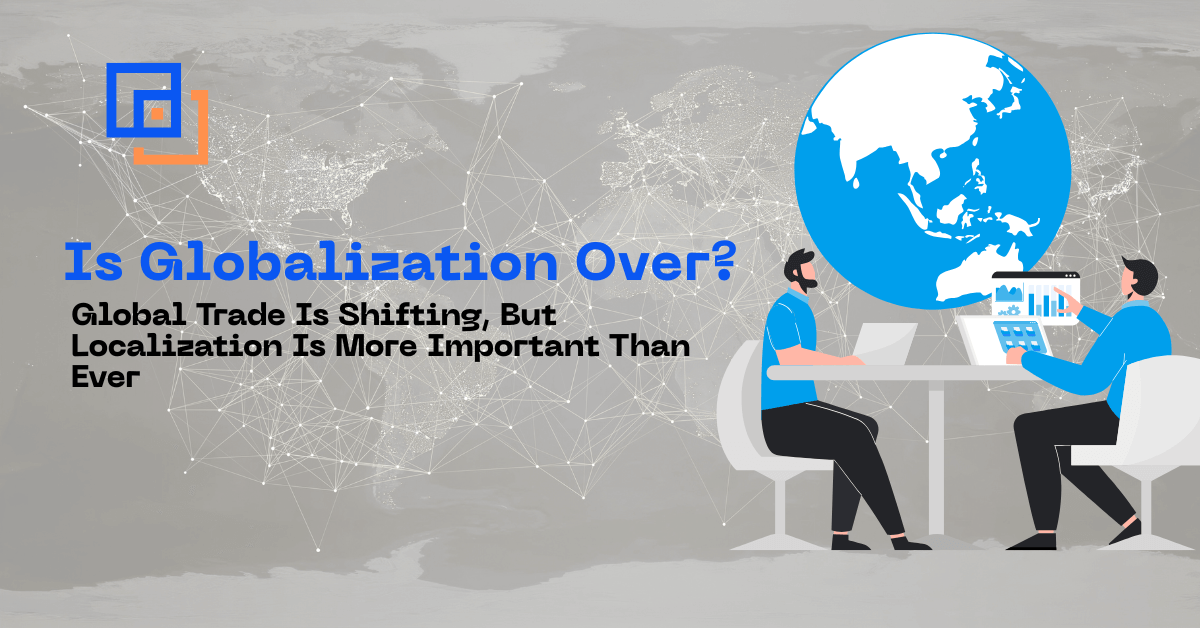Is Globalization Over? Global Trade Is Shifting, But Localization Is More Important Than Ever

Global trade has changed. Things can’t be done the old way anymore.
Earlier, businesses tried to make things quick and cheap. They made long lines of supply that went through many countries. For years, this worked well. But right today, things are different.
How the Game Was Changed?
In the last few months, the world had a lot of troubles. Wars began to break out. Supply chains broke. Important routes were not accessible for ships. Countries started to fight over trade. Recently, new rules were made about technology and the environment.
Businesses had to think twice after these events. They learned that sometimes being cheap isn't a good idea.
Nowadays, businesses want supply chains that always work, even if something goes wrong. They need back-up plans. They want to be prepared for surprises.
Globalization Isn't Dead
A few people believe that globalization is now over. They are wrong.
Global sales are still going on. Products are still made abroad. Currencies are exchanged globally.
However, the goal post has moved. Businesses now want loyalty and safety. They want more growth and stability.
This is where localization matters.
Significance of Localization
Look at McDonald's. They sell burgers in every single location. There don’t sell beef in India. In Japan, they have rice burgers. The business stays global but works locally.
These methods succeed because individuals seek what fits their lives. In their culture, they want goods that make sense. They are looking for messages that they can comprehend.
Nowadays, smart businesses do these things:
• They research every market before going into it.
• They adapt their goods to meet the requirements of each area.
• They establish ties with local vendors.
• They engage local people who grasp the culture.
More Than Just Translation
A lot of businesses think that localization means translation. They are missing the point.
Real localization explores further. It shifts words, images, and colors. It changes prices to reflect the income and currency in that area.
Consider how to pay. Americans make use of credit cards. Germans like to use bank payments. Chinese buyers pay with their phones. A multinational corporation has to embrace all these approaches.
Colors are another option. In the West, white means "pure." Within several Asian nations, it is a synonym for death. Someone who makes wedding dresses would need to know this.\
Small Companies Can Go Global Too
Now you can sell globally without becoming tremendous. Small businesses can now reach people all over the world.
All of this is made possible via online platforms. Amazon deals with billions of consumers. Social media lets brands reach people all over the world.
But you still need to think locally to be successful. A modest coffee company can export to Japan. But they need to know how Japanese people like their food. The product should appeal to Japanese.
Now, you have the resources at your disposal. Localization makes the difference.
Industries That Need Localization Most
• Healthcare businesses must perfectly translate medical data. The wrong directions could hurt the patients. Drug names must be clear. Dose directions must be exact.
• Government organizations help a wide range of people. They must talk in languages that people can understand. Only if individuals can read important information can it save lives.
• Legal companies deal internationally with contracts. One wrong word might alter the meaning of a contract. Different countries have very different local rules.
• Professionals in education work with kids from a wide range of backgrounds. Learning materials must be culturally relevant. Students' experiences must be linked to the examples.
• Manufacturers must follow each country's safety rules. Clear instructions are required. There must be warning labels.
The Smart Approach: Think Global, Act Local
Large or small, the best businesses don't pick between them. They engage in both.
They make systems that work everywhere around the world. These methods are then changed for each market. In this way, they are more effective and useful.
Global systems handle things like:
• Product development
• Supply chain management
• Technology platforms
• Brand guidelines
Local adaptation covers:
• Marketing messages
• Product features
• Pricing strategies
• Customer service
Getting Started
When a business wants to go global, it should start small. Pick a business that makes sense. Carefully examine it. Assess your strategy. Learn from errors.
Partner with people in the area who know the market. They can direct company procedures, marketing messages, and product modifications. Their information helps you save time and money.
Make decent investments in localization and translation services. Economical choices often lead to costly issues. Good work develops trust and avoids misunderstandings.
The Bottom Line
This is not the end of globalization. Things are changing.
Businesses that think widely but act locally will do well in the new global economy. They accept local diversity while building global systems. The key to their success is leveraging technology to tap into local expertise.
Businesses that don't pay attention to local areas will have a hard time. Those that value localization will do great. Picking one option is easy.
The world is still linked. But the most effective relationship is one that is felt on a human level. That's why localization is more important than ever.